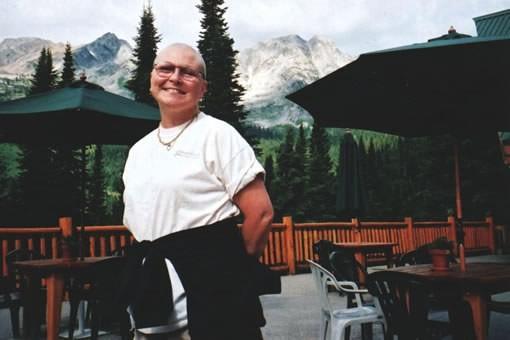Friday, May 10, 2024 10:00 am PST Register Please join Dr. Eman Hassan, Executive Director, BC Centre for Palliative Care; and Adjunct...
A Legacy of Love
During a routine medical exam on her 50th birthday, Marnie Hodge was diagnosed with breast cancer. Four years later, inspired by a trip with Vernon healthcare organization Nicaragua Fuente de Vida Society, Marnie took a refresher course and returned to her earlier nursing career. When 12-hour hospital shifts proved prohibitive, she moved to eight-hour shifts at Hospice House, where she remained for ten years.
“Marnie found her true calling when she started working at the Hospice House,” says her husband of 19 years, North Okanagan Hospice Society accountant, Nick Hodge.
A true Renaissance woman, Marnie had studied anthropology, adult education, desktop publishing and the United Church Ministry, as well as nursing and palliative care. But as an RN she was unparalleled. “Her empathy and ability to speak for those who could not speak for themselves, animals included, set her apart from others,” says Ruth Edwards, Executive Director of North Okanagan Hospice Society. Care Team Leader, Elsie Swartz, agrees, “She was a special person. She cared for everyone and everything, even the smallest insects.”
“Marnie combined clinical expertise and knowledge with a heart of compassion. She was able to look at our residents and put herself in their shoes because she was fighting a life threatening disease herself,” says fellow RN, Jocelyn Adamson, who met Marnie during a nursing refresher course. “During the course, Marnie discovered that cancer had spread to her liver. I assumed she would stop the refresher, go home and prepare to die. Instead she continued the course, had chemotherapy, lost her hair and inspired us all. She began caring for patients at Hospice, who like her, had cancer. The fact that she was working, while bald, gave others hope. And she lived 10 more years. Marnie was someone who truly lived until she died. Talk about perseverance.”
When hospice nursing became too physically demanding, she switched to administration. “Her life experience gave her a broad perspective on issues. Her thoughtful, inclusive approach to her role as Organization Development Leader ensured that all aspects of a concern were addressed prior to making a decision,” says Edwards.
“In this busy healthcare climate it is easy for nurses to become task oriented and just get the job done,” says Adamson. “Marnie did the tasks, but never lost sight of the priorities. She saw our residents as family members. It was common to see Marnie sitting at the bedside with the patient’s hand in hers, chatting, comforting, listening.”
“It was never about her,” says Adamson. “With all she was experiencing: physical pain and uncertain life expectancy, she always had the time for others. She was a giver, not a taker.”
From the moment of her diagnosis, Marnie was the leader and expert for her own recovery plan, embracing the support of her family and doctors in the Okanagan and Vancouver. She kept fit as a Dragon Boat paddler with Vernon’s Buoyant Buddies, worked with a personal trainer and attended classes and retreats in Qigong, a practice of aligning breath, movement and awareness.
“She was open to trying all sorts of remedies, willing to do anything, travel to Vancouver, join new drug trials if necessary,” says Nick. “She got tremendous support. I’m amazed at the unbelievable knowledge of the doctors. She got overlapping, seamless care.”
Nonetheless, Marnie knew she had to plan for a time when she could no longer make her own decisions. So in characteristic fashion, Marnie put her family first by completing the My Voice: Expressing My Wishes for Future Health Care Treatment planning document well ahead of time.
“She walked us through the entire document. She had thought it through totally but still wanted to know what we thought of her responses,” says her daughter Libby.
“She was still in good health at the time. It really helped to have things decided way ahead,” says Nick.
“The concept of planning one’s death is difficult for most people to deal with, so the structure this document brings is very helpful,” says her son Eric.
Fifteen years after her first diagnosis, Marnie’s last three days were spent in her beloved Hospice where she had cared for so many others. “She was calm and relaxed, received high quality pain management, and was never uncomfortable,” says Nick.
“Hospice staff do anything and everything to make you feel at home,” says Libby. “They moved mom to a room with a view of the rose garden, provided her favourite music and food. There was always someone there to help so we had no worries. The staff took care of everything so we had the time with her.”
“The Hospice felt like a safe area where we could do no wrong,” says Eric. “I can’t imagine a better group of people to be working there. The level of gratitude I feel towards them all is beyond what I can fully express in words.”
“Much of the work that Marnie did at Hospice was future focused,” says Edwards. “We continue to use Marnie’s research and reasoning in decisions that will affect the future end-of-life care in the North Okanagan.”



